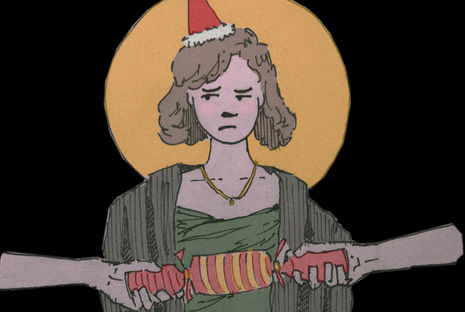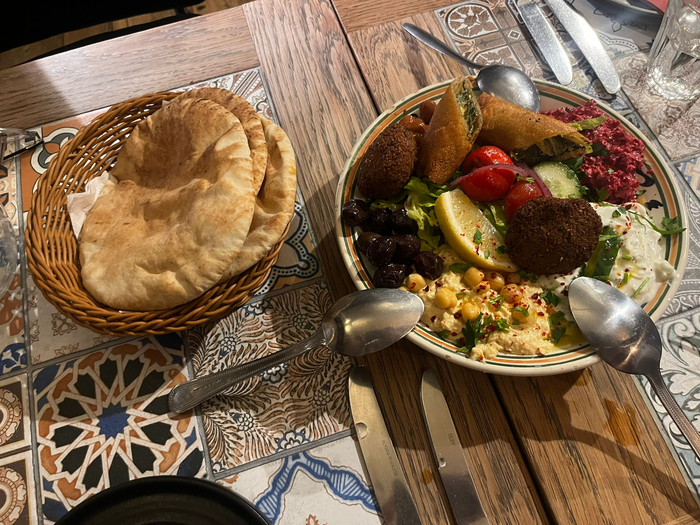Pass me the stuffing and leave me alone
Gabrielle Saraway tracks down the grinches of Cambridge

It’s Christmas time, mistletoe and wine, 21-year-olds singing Bublé out-of- tune after too much of said wine. December is dawning, advent calendars are flying off the shelf, and the festive spirit is settling in. I adore this time of year, and looking out for the love that ‘actually is all around’. However, among us walks a band of Christmas loathers: people who dislike the season, not for faith-based reasons, but rather for a lack of joy in their hearts.
So, I set myself the mission of finding these mystical people. I was daunted by the task that lay ahead of me: I was a fish out of water, a Lapland elf wandering around the Financial District, but someone had to tell their story.
“The problem with Christmas is simple: too many people and not enough chairs”
Ioachim, a postgrad, arrives ten minutes late to his interview (his flatmate confided that their fire alarm had gone off earlier that day and Ioachim could be heard crying out expletives through the walls). He sits down opposite me and cradles a herbal tea in his hands. From the outside, he would appear a reasonably cheerful man. I would even go so far as to say that, from a distance, he could be interpreted as having a jaunty way about him. However, after I ask him whether he considers himself a joyful man he tells me that he is only “happy two times a week”. I ask him when these times are and he replies: “Monday, when I have hope for the week, but it is all gone by Wednesday”. I then question him over what fuels his disdain for Christmas, and he lists off reason after reason: its over-commercialisation, the façade of happiness that people project, the “giving spirit” that seems to circulate the air, and the fact that he has to put up with people he would rather never see. I ask him what his ideal Christmas would look like and he pauses before telling me that it would be spent “with friends at a strip club”. He registers my shock and assures me that, despite his disdain for the season, the establishment would be “festively decorated”. I thank him for his time and wrap up the interview.
“One day we’ll all be in the ground, and you can’t take a macaron Labubu with you”
But Ioachim is not alone in being jaded. Soon enough, another Christmas-loather emerges: my friend’s father, Mark. For him, the problem with Christmas is simple: “too many people and not enough chairs”. “Christmas means being inside and wanting to be outside.” This surprises me as I sit wrapped up in five layers fearing I have caught frostbite from stepping outdoors for two minutes. When I ask Mark what Christmas’ redeeming quality is he says: “the break from work is universal so in January you aren’t playing catch up”. I note he makes no mention of his children here and so ask whether seeing them is also a redeeming quality, to which he responds that Christmas isn’t “particularly unique” for that: “it’s nice to see everyone until it’s not”. His son then questions why he won’t wear the hats out of Christmas crackers, and he says, “I have a deep-felt aversion to ceremony.” I now understand where his son gets his joie de vivre from.
“Serving carrots to relatives who have the incredible gift of offending every possible demographic within 60 seconds”
For Lauren, a recent Cambridge graduate, her feelings towards the festive season are more complicated. As a child she used to love this time of year but has found with each John Lewis advert that it’s drifted from something magical to something overly materialistic: “even if it’s Lily Allen singing Keane’s ’Somewhere Only We Know′ it’s still symbolic of a company. One day we’ll all be in the ground, and you can’t take a macaron Labubu with you”. She sighs when talking about the desire for excess the season generates, but it’s when I ask her about her favourite Christmas memories that her voice softens. She talks about spending time with the people she loves and her grief for the people she’s lost: “My grandfather would always make these incredible pigs in blankets. He would chop up dried apricots and wrap them in sausage meat, and he’d always put them in tupperware just for me. Since he’s passed away my mum has taken over the mantle of cooking Christmas dinner, but she always makes pigs in blankets the exact same way”.
Lauren is no Scrooge: she still finds joy in Christmas, but it’s bittersweet. She acknowledges how, for those without a seat at the table, the magic of Christmas can become overshadowed by the loneliness. “It’s about making someone else’s Christmas more magical,” she says, when I ask her what this time of year means to her.
So, you may find yourself sitting at a table this Christmas with a group of people who would rather not be there. Look to your left and you might see a girl quietly remembering her late grandfather’s recipe, and opposite there might be a nihilist with a herbal tea wishing he was at a strip club. But the joy of Christmas is being around a table with people: spending time with those you love, welcoming in those who feel neglected and isolated, and serving carrots to relatives who have the incredible gift of offending every possible demographic within 60 seconds of talking. Christmas is about making conversation with the Scrooge next to you, who professes there is no joy in anything, and then passing them the stuffing anyway, because you’re at dinner, you’re together, and you don’t want their food to go cold.
 News / Colleges charge different rents for the same Castle Street accommodation2 March 2026
News / Colleges charge different rents for the same Castle Street accommodation2 March 2026 News / News in Brief: waterworks, wine woes, and workplace wins 1 March 2026
News / News in Brief: waterworks, wine woes, and workplace wins 1 March 2026 News / Angela Merkel among Cambridge honorary degree nominees27 February 2026
News / Angela Merkel among Cambridge honorary degree nominees27 February 2026 News / Climate activists protest for ‘ethical careers policy’1 March 2026
News / Climate activists protest for ‘ethical careers policy’1 March 2026 News / King’s hosts open iftar for Ramadan3 March 2026
News / King’s hosts open iftar for Ramadan3 March 2026









